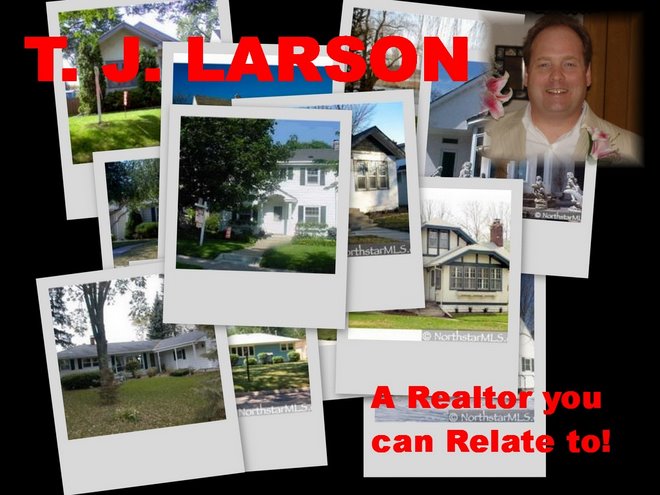Not to toot my own horn(TA-DA!) but I recently had the good fortune to be interviewed by Molly Priesmeyer of the City Pages -Metro Living Guide. I think it is one of the best articles written locally about the current real estate market in the Twin Cities. Here's an excerpt on Selling Your Home:
Life is a Stage
Speaking of showing buyers, sellers need to remember that homes are a reflection of our lifestyle. It's not about where we live, as much as it's about how we live. Like our fashion choices, or homes are a reflection of who we are. As a seller, it's your job to figure out who your buyer will be, and work hard to show that buyer how your home can reflect their lifestyle.
According to T.J. Larsen, an independent realtor and blogger who writes at tcrealtor.blogspot.com about real estate trends and tips, the largest population of local homebuyers is between ages 24 and 40. "Buyers are getting younger," Larsen says. "And so are Twin Cities neighborhoods."
Here's a segment on how Buyers can really capitalize on the Current Market:
SAY HELLO TO GOOD BUYS
It's a buyers' market. But how can you ensure you don't get trapped in a bad deal?
Twin Cities neighborhoods are changing as quickly as spring turns to summer. The Light Rail line is connecting neighborhoods and new and old neighbors. Downtown and the airport are more accessible than ever before. Transportation has become easier and less time-consuming. And improved parks and the Greenway are making biking from downtown to the suburbs a beautiful and breezy ride.
Outside of the immediate metro area, suburbs are becoming miniature cities. Urban planners and designers are paying more attention to streetscapes, turning main streets into thriving destination spots. And new locally owned restaurants and shops are popping up all over the Twin Cities and the suburbs like tulips poking their heads out in May. This diversity of living experiences is exactly what buyers need and want, says independent realtor T.J. Larson. So if you're looking to buy smart and gain equity, buy in a neighborhood that has something to offer not only you, but future buyers, he notes. Most buyers these days are between the ages of 24 and 40. You want to think about young, hip urbanites them even when you're thinking about yourself, Larson says.Location, Location, Location
You've heard it a million times. Location matters! Before you make an offer, you need to ask yourself, is it a good location? Will it hold up over time? To get an idea of the price you'll offer, make sure you do a sales analysis of homes in the area. Don't be afraid to ask the agent to give you evidence of what similar properties have recently sold for, Larson says. If you're buying in Minneapolis or surrounding suburbs, be sure to investigate through the Hennepin County site (see sidebar, "Sell Smart, Buy Wise") what the seller paid for the home. This will give you more negotiating space. "You also need to trust your instincts," Larson says. "Go back and visit the neighborhood and the home without your agent. Check it out again on your own; trust yourself." What are the kinds of locations that will hold up in the future? Larson says the neighborhoods with the brightest futures are the ones that offer trendy establishments, but still have the traditional icons that make Minnesota unique. Neighborhoods that have, say, a VFW hall or an old-school Norwegian bakery near a hip, minimalist new wine bar are exactly the quirky Minnesotan qualities that make will make neighborhood desirable over time. "Things are really changing in the Twin Cities," Larson says. "And it's a really great thing. People are creating their own communities now. They're becoming urban planners, in a way." Not only will this trend change the face of Twin Cities neighborhoods, but the younger buyers and their needs will start affecting a change in public education and public policy as well. And small-service businesses that cater to urbanites will continue to excel and thrive in community-focused neighborhoods. Pet stores, convenience shops with organic goods, coffee shops, for example, will only benefit from the shift in demographics and lifestyles. Larson calls the shift a continual spread of the Uptown phenomenon of 15 years ago. Neighborhoods East of Hennepin are continuing to grow, adjust, and become revitalized with each new project and shop. St. Paul neighborhoods are benefiting from the shift, too.
And...
Don't Be Afraid to Make Demands
No matter how pushy they might be, never let the realtor take the reins. "Realtors used to be the gatekeepers of information," he says. "Now, with the internet, all the cards are turned over on the table. It's as transparent now. Everyone benefits if you have that." In other words, do your research. Before you chose to spend hours driving all over town with a real estate agent you're unsure of, ask the agent for references. Interview them like you would any prospective employee. And make sure you're clear about your needs and that the agent understands them. "You want to make sure your realtor is someone you like and trust," Larson says. "You're going to be spending a lot of time with them. Make sure they do the work for you," he says. As a buyer, you can also demand that the seller do the work, he says. Ask them to pay your closing costs. Ask them to make all the necessary repairs. And don't be afraid to negotiate on the price. Meaghan Miller recently purchased a home in South Minneapolis. The 28-year-old graphic artist stumbled upon the home while traipsing through open houses one Sunday before the holidays. The sellers had already moved out, leaving the home bare. It was an immediate sign, Miller says, that she would have the upper hand when it came to negotiating. "The family had already moved away and had to sell fast," Miller says. "I knew it immediately walking in. So I was able to buy it for $6,000 less than the asking price, and get them to pay my closing costs." And though Miller liked other homes better, the stage had been set: She knew she had a sweet deal.
Crash and Burn?
While 2006 saw the biggest drop in home sales in nearly 20 years, Larson says there's no evidence to suggest that the Twin Cities is suffering from a major crash. Instead, he says, the bubble is merely releasing some of that hot air. And home prices are becoming more realistic, and luckily more affordable. "Affordable housing is a key to sustaining a city," Larson says. "And already we are short on affordable housing. It's necessary to the survival of the Twin Cities." More choices for buyers is a good thing, he says. While the market bottomed out last year, evidence suggests it will remain steady - but realistically steady. That means if you're purchasing a new home, don't expect to see 11 percent increases in value in a single year. Instead, Larson says, a conservative estimate is that home prices will continue to increase over the next 10 years at about five percent per year. "Five percent isn't horrible," Larson says. "If you buy a $200,000 home, in five years you've made more than $60,000. And that's being conservative," he adds. In other words, Larson says, there's no better time to buy. And there's no better time to be living in the thriving Twin Cities.
Read the entire article here Thanks Molly for the excellent article!





